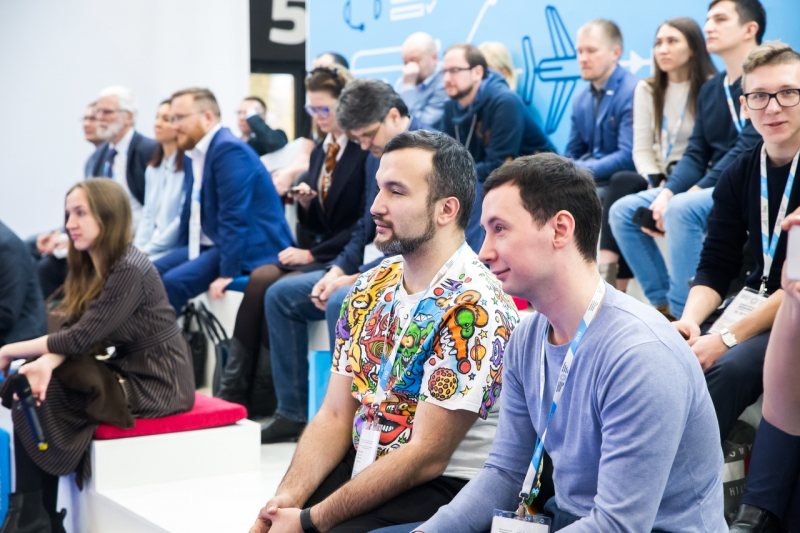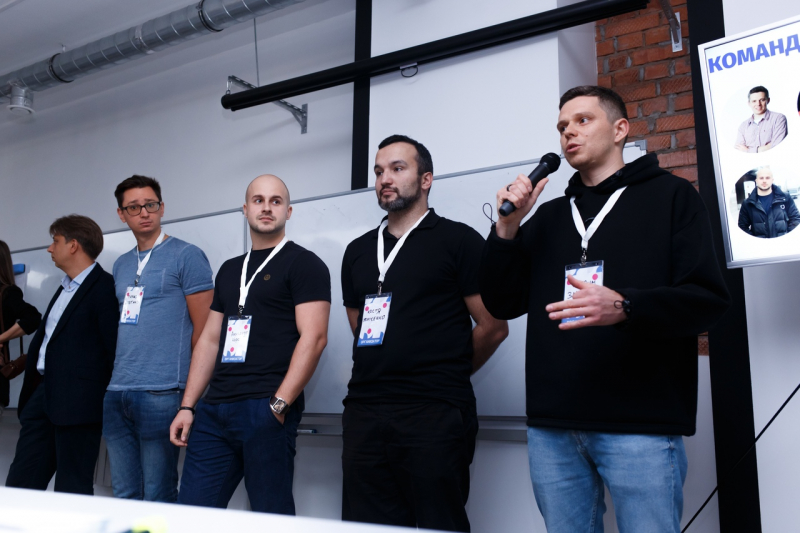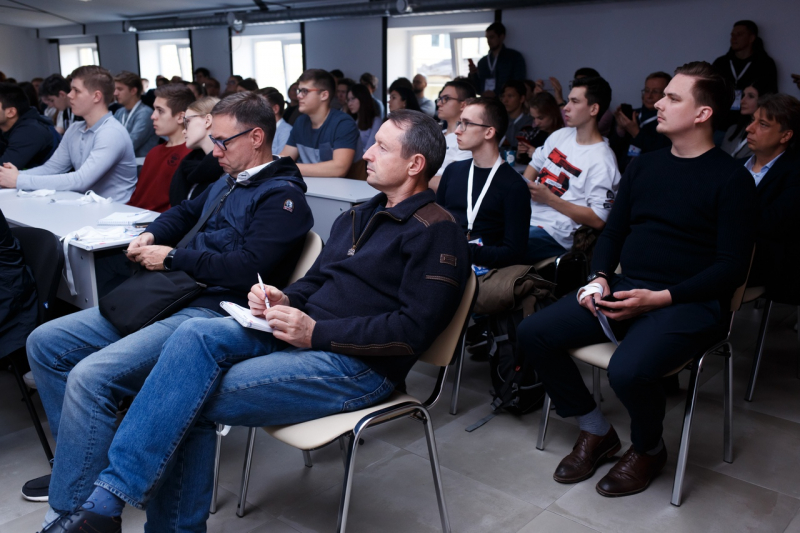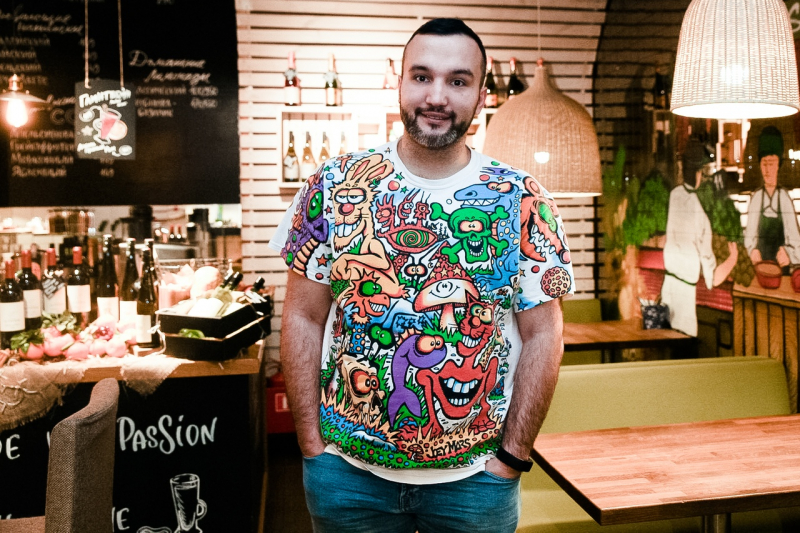Why ITMO University?
I enrolled at ITMO in 2006. I was interested in IT, and already back then, ITMO had the reputation of one of the leading universities in this field. This is why when choosing between ITMO University and St. Petersburg Electrotechnical University “LETI”, I eventually picked ITMO. After joining the university, I was advised to major in optical technologies, which I did. When studying at the Faculty of Optical and Information Systems and Technologies, I got into physics. After a while, when nanotechnologies gained popularity, I transferred to the Faculty of Optical Material Engineering.
What is your brightest memory of your university years? What knowledge and skills that you received at university came in particularly handy in your career and life in general?
In my opinion, it is crucially important to understand that you attend university not to be taught, but to learn something. If you aren’t ready to learn, it’s all meaningless: it doesn’t matter what lectures you listen to and what workshops you participate in – if you don’t want to learn, you won’t. The most important thing that I learned at university is the ability to think and quickly analyze a huge amount of data. I only have good memories of my time at ITMO University: the thing is that I was part of ITMO University’s rock club, and thanks to that I met a lot of interesting people.
As for the educational process, the turning point for me was was when I met my research supervisor Vladimir Aseev in my fourth year. Before that, I didn’t want to do anything at all and even thought about leaving the university. It was Vladimir Aseev who changed everything. He taught me laboratory work, helped me understand what I wanted to do with my life, made me study, and it was great. I wish there were more lecturers like him. He helped me choose my Master’s program and graduate from it.
How did you start your career? When did you start thinking about launching your own business?
After my fourth year, I tried to get a job at one large optical plant, which, I think, doesn’t even exist anymore. I was offered a salary of 15,000 rubles, which could grow to as much as 25,000 rubles in a couple of years. I didn’t like that at all and started thinking about what else I could try my hand at.

I knew that I was interested in physics, but at the same time I very much enjoyed working with people, organizing stuff. Already when working at ITMO’s rock club, I was good at establishing connections, organizing other people’s work, doing product management and so on. So I decided to go in the opposite direction and started thinking about launching my own business. However, I did not dare to take the risk back then and found a job in sales instead. I called people selling building permits. In such a position, you make some 100-150 calls a day, and people are not always happy to talk to you, to put it mildly. It was then that I realized that there is such a thing as marketing. I created my own website, which immediately attracted my potential customers, and already in the first month I made not one or two sales, but five. This is how my career as a businessman started.
After a while, I was promoted to the position of the head of the sales department, and then the commercial director. In the course of seven years, I worked in various managerial positions at different companies. At some point, I decided to get a job at a marketing agency, as I was interested in marketing and wanted to fully understand how things work in this field. At some point, I was offered to become the CEO of a separate semi-independent unit of this company. I realized that the fact that I got such an offer meant that I was good at it and decided to open my own agency. At first it was very hard to quit a job with a good salary, but I had a dream. I decided to take the risk and I’m glad that I did.
Do you still keep in touch with ITMO University and why?
I think that people are the most important aspect for any company. At ITMO University, I met with Aleksey Solomatin, who is now the head of ITMO’s Accelerator. He invited me to participate in one event, and I really liked its format and the fact that I could share my knowledge with students. I realized that I could help the project and Aleksey realized that too. This is how we started collaborating on more and more projects and I eventually became a coach at the Accelerator.
What tasks do you as a coach face?
My responsibility is helping the Accelerator projects I work with set themselves business goals, move forward and solve their tasks. My goal is that they generate viable products, sales and suchlike. All in all, the people that approach me are different, with different levels of entrepreneurial skills, and my task is to accept the person as they are, and help them implement their idea based on their skills. Not tell them what they have to do, and not make things up for them. My task is to help them, based on their resources, implement their project in a way that would be comfortable for them. Even if I see the solution that they offer as not optimal. They have to make their own mistakes, they’ll then correct them, confirm their hypotheses. We have one project that has recently won a prize from Gazprom, they often approach me about presentations, I help them. They’re very hard-working, they do more than other projects, thrice as much. It doesn’t mean that they are better than the others, it’s just their speed.

I see that a lot of students who come to us already know what they want to do with their life and career but often create their own obstacles. They think about such things as how they will communicate with big partners and clients. The answer is simple: you just do it. The hardest thing when launching your own business is to get started. However, four out of the eight projects that I’m coordinating have already made their first sales, and I’m very happy for them.
Have you ever invested in any hi-tech projects?
I haven’t invested in any projects at the Accelerator because we have a somewhat different relationship there. Apart from that, as I’ve already mentioned, not all of the projects there need seed money. Outside of ITMO, I have bought into a couple of projects.
And how was that experience?
The Russian market is very local. I, for one, joined the project of a marketplace for advertising spaces. The idea is that there is a huge market of advertising spaces on offline carriers at some establishments and you can buy an advertising opportunity in a place that corresponds to your interests. But I haven’t yet had any projects that would’ve really earned me a very large sum of money. There are some I earn a rebate from, so there is money involved. But all in all, I can’t say that I’m a professional investor yet, I don’t yet have the money to make serious investments into several projects at once.
What mistakes do novice companies make the most? What can beginning entrepreneurs be advised to avoid?
I’ll name three things. First is that many people don’t understand why they decided to start their business in the first place. It seems to be a stupid problem, but when we ask someone why they want to set up their own business, it often happens that we can’t get a clear-cut answer. This is a source of other difficulties: why does a person develop some super complex website instead of testing their hypothesis with minimal costs first?

But usually, the answer is simple – I want to start a business because I want more money. Isn’t it?
This is a difficult question: on the paper, yes, many companies’ charters state that they set up their business to make a profit. But let’s look at the example of two restaurants: one was opened by an out-and-out foodie, a gourmet who puts their heart and soul into their venture; while another belongs to your typical moneymaker who uses it just to pump out money. What restaurant are you most likely to want to attend? Probably the first one, because the second one may skimp on products, interiors and staff, including good chefs. That’s why it’s good when money isn’t the sole purpose of it all. Of course, I’ve met cynical billionaires who are only set on earning as much money as possible; some may like it, but I’d like it more if the world had other values apart from money.
So the first problem is not understanding why you’re starting your business. What are the other two?
The second problem is that people often forget that, though of course we’re all entitled to be different, it’s always important to test your hypotheses. Entrepreneurs tend to go off of what they want, not thinking about what people really need. For example, someone starts a company on selling real estate and decides to focus on two-storey apartments. Because it’s cool, because there are no such offers on the market. But a question arises, what if nobody needs these apartments in the first place? Or this is only interesting to a very small segment of customers. You’ll have to look at the demand, look at how many relevant searches in Yandex and Google there are, how people react to your idea. But many straightaway rush into making a hi-tech website, buying the apartments, rebuilding them, and only then dealing with the issues of supply and demand. But what if there’s no demand? Maybe it would’ve been possible to save time and money by establishing this from the start?

Finally, the third difficulty is that people tend to speak about the things they lack. That they lack money, time, knowledge, experience. Yes, there are fields that you won’t be able without all this, but most of the projects you can start right then and there using the simplest solutions available. Many operate with no seed money at all, I started out with no seed money, and I don’t believe that all businesses need seed money. Startups need money when they can use it to buy some time. For example, you can use money to purchase a faster development rate, beating competitors to the punch in conquering the market.
But, say, before you start printing something on a 3D printer on an industrial scale, you have to buy this printer first?
At the very least, you have to ask yourself if you could do what you’re planning to do without this or that thing. For instance, why do you need to buy that 3D printer when you can print a pilot batch on a rented one? Or Iet’s imagine that I’m going to open a new restaurant offering some unique cuisine. Can I rent the venue instead of buying? Or, maybe, make arrangements with an owner of an already existing restaurant to test your format on their venue? You can always make a bargain with someone, and this is, by the way, something that is often underestimated by startupers: the power of arrangements and human relationships in general. People are what’s most important.
And what if someone does ask all these questions – where to get money, experience, partners – is it possible that they’ve not yet matured enough to start their own business?
There are three types of people: the first type acts first and thinks second. They have a big chance to become entrepreneurs, but the question that stands is how scary could be the mistakes that they’d make, and what consequences they’d be faced with. Some even say that business is working with consequences. The second type of people thinks first and acts second. It’s also good in principle, you have to preliminarily evaluate the situation before proceeding with some action, but this is less of an entrepreneurial approach: you can’t take everything into account.

There is a third type of people – those who think first, and then think some more. They don’t act. And there are lots of these people out there; if you go on the subway, you can notice a horde of sad adults, eyes looking down, angry at life. But they’re not ready to change something, to do something. To all who want to become entrepreneurs or build a career, I recommend to do something, at least something. There will be mistakes, but you have to persevere, and sooner of later you will see success. You can’t fight your fear before setting up a business or starting a new job. Fear is part of us, you have to accept ot. Don’t be afraid to do something; take this fear in your stride and just do it.
You specialize in marketing. How well do young entrepreneurs, startupers, measure up in this aspect?
Startups, and indeed grown-up companies too, often experience problems with marketing. Maybe my standards are too high due to professional deformation, but when I look at how people interact with their customers, I’m sometimes horrified. Absolutely unprofitable, uninteresting offers. Companies often use their advertising materials to speak about themselves and not what the client would want to hear. When I go on a website, I want to find out what a company can offer me, what of my tasks its product or service could solve. Usually websites just scream about how great the company is – why do I need this information if it’s solving my problems that I went to their website for?
This also often goes hand in hand with stupid technical glitches: even in 2019, you don’t need to search a lot to find a website with some form that just doesn’t work. Or submit a request but they only contact you 12 hours after, if at all. As a result, these companies lose clients. Why do that?

It used to be said that it is a bad postdoc that can’t start their own business. You were doing science at university before launching your own business, albeit in an entirely different field. Do you agree with this statement?
Not in the slightest! People don’t have to do business. It’s always better to do something that makes you and others happy. The more happy people there are, the better is the world at large. A happy person tends to want to make other people happy, too. If everyone were to hate what they do – be it science or business – they’d just be pouring all this stress on others. If you want to become an entrepreneur, make steps towards this goal, but this isn’t the only way. If you want to be a doctor, be one; if you want to be a physicist, focus on physics. But don’t fight what you are, your nature. Find how to make it profitable. A good venture must be cost-efficient or else it’d be superseded by a bad one. Saying that, no-one should worry about failing to launch their own business. On the whole, business people are few and far between; you can build any career whatsoever, do your thing and lead a vibrant, happy, interesting life.




